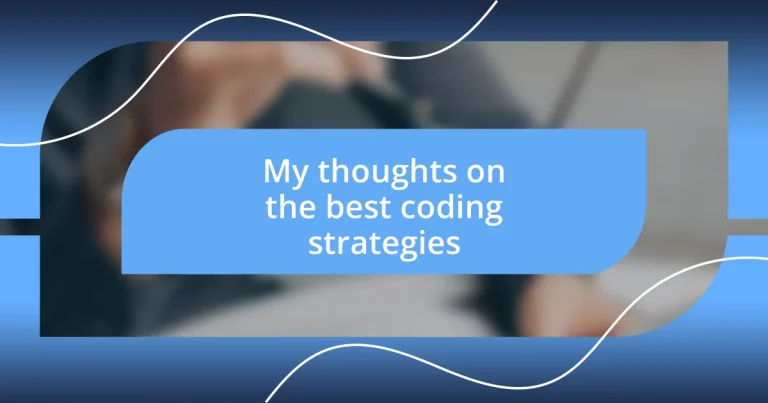Key takeaways:
- Effective coding strategies enhance collaboration, reduce errors, and foster adaptability throughout the development process.
- Key principles for success include code readability, early testing, and maintaining modular design for better code management.
- Optimization techniques like minimizing computations, using appropriate data structures, and implementing caching significantly improve code performance.
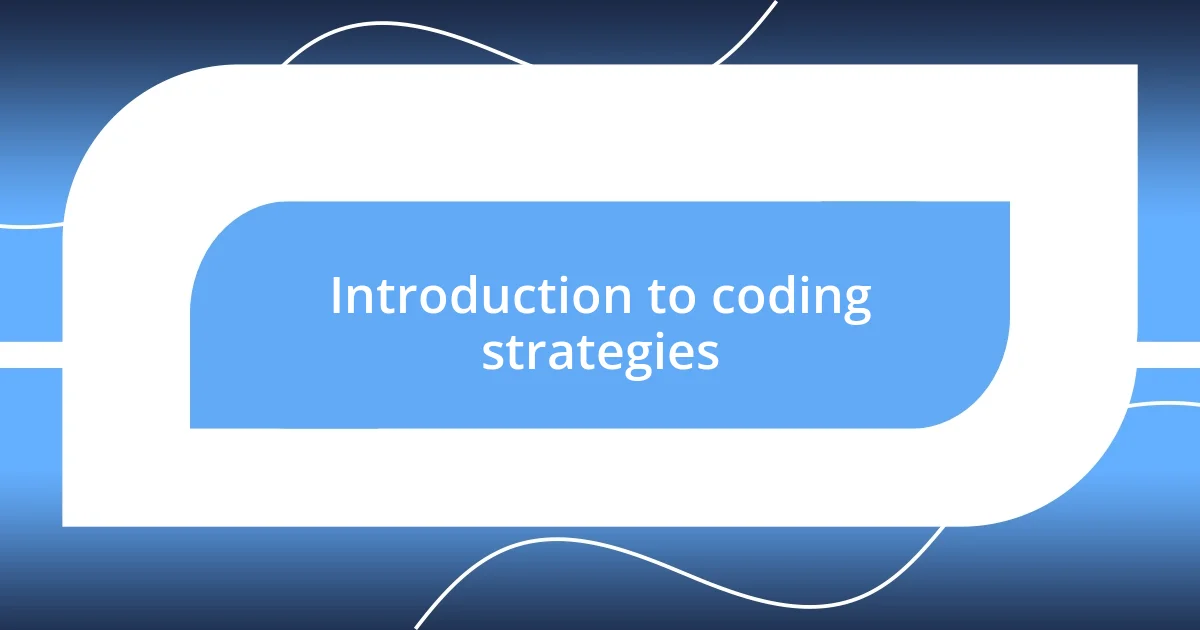
Introduction to coding strategies
When I first ventured into coding, I quickly learned that having a solid strategy could make or break a project. Honestly, the initial days were overwhelming; I found myself wrestling with countless languages and frameworks, unsure where to focus my energy. Isn’t it fascinating how one thoughtful approach can turn chaos into clarity?
As I refined my coding skills, I discovered that the best strategies often blend creativity with systematic thinking. For example, when I tackled a challenging bug, I realized that taking a step back and breaking down the problem into smaller, manageable pieces illuminated the path forward. Have you ever experienced that “aha” moment when simplifying a complex issue turns everything on its head?
With coding strategies, the journey is as important as the destination. It’s not just about writing lines of code; it’s about understanding how to approach challenges and design software that truly meets users’ needs. Each strategy I’ve adopted has shaped my development style, and I’m eager to dig deeper into what makes these approaches effective and transformative.
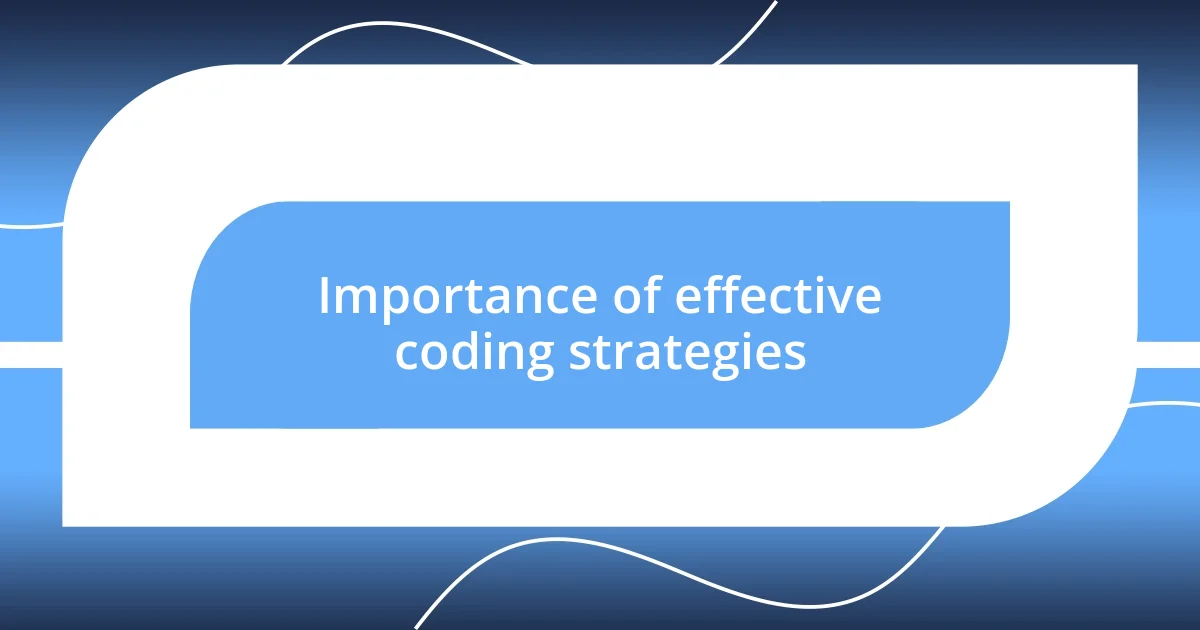
Importance of effective coding strategies
Effective coding strategies play a crucial role in ensuring that projects not only succeed but also evolve seamlessly over time. I’ve experienced firsthand how a well-thought-out plan can cut down on headaches. There was a time when I rushed into a project without a clear strategy, and the mess that ensued taught me the value of foresight. Planning ahead might feel tedious at times, but it pays off when everything falls into place like a well-crafted puzzle.
- Reduces bugs and errors through methodical approaches.
- Enhances team collaboration by establishing clear guidelines.
- Streamlines the debugging process, saving time and frustration.
- Fosters a deeper understanding of the code, leading to better decisions.
- Encourages adaptability to changing requirements, helping projects stay relevant.
When I think about the importance of coding strategies, I recall a project where I adopted pair programming. This approach not only made the process smoother but also created a supportive environment to share knowledge. The collective problem-solving sparked creativity and made the coding experience not just productive, but genuinely enjoyable.
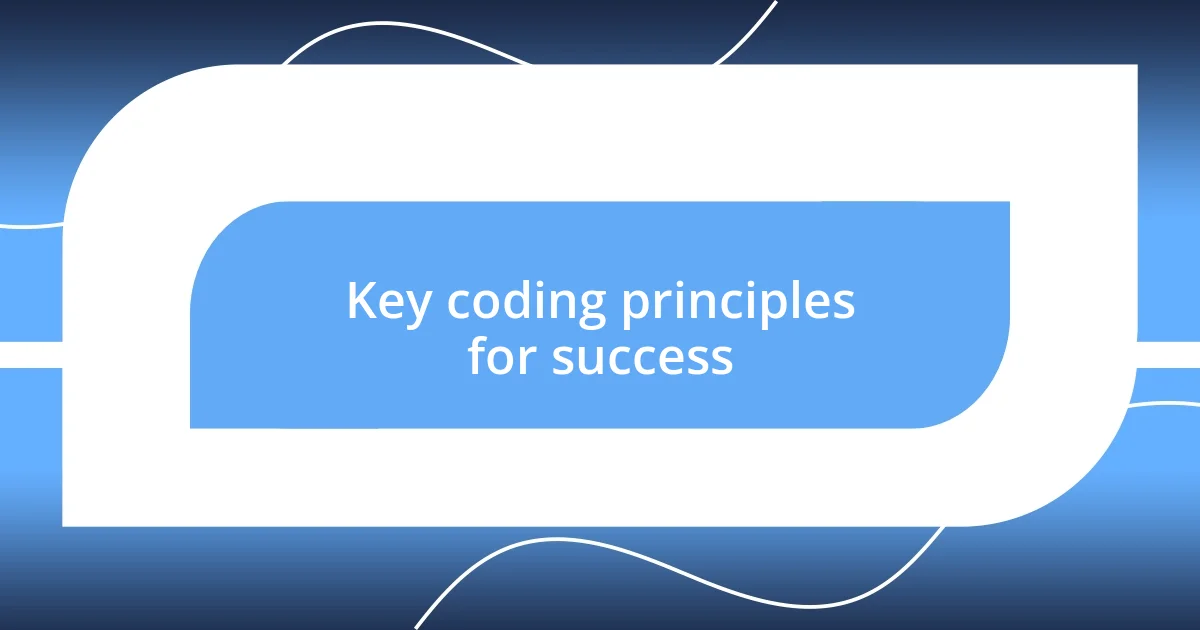
Key coding principles for success
One of the fundamental coding principles I’ve embraced is the concept of code readability. When I first started coding, I often wrote dense blocks of code that only I could understand. Over time, I realized that writing clear and comprehensible code not only aids my future self but also helps others who might work with my code later. Have you ever found yourself staring at your own code, unsure of what you meant? Clear documentation and consistent styles can save you from that confusion.
Another essential principle is testing early and often. Initially, I’d save testing for the end of a project, thinking it would save time. However, I soon learned that catching bugs early is far more efficient. I recall a project where I implemented unit tests as I coded, and to my surprise, it helped me identify issues before they escalated. This not only improved the final product but also gave me peace of mind during development.
Lastly, I can’t stress enough the importance of keeping your code modular. Early on, I feared that breaking my code into smaller pieces would complicate things, but it turned out to be the opposite. Modular code is easier to maintain and enhance. I remember refactoring a monolithic codebase, where every change felt like a gamble. Once I started to embrace modular design, those fears melted away, and I found joy in tackling enhancements without dread.
| Coding Principle | Description |
|---|---|
| Code Readability | Writing clear and understandable code that aids both current and future developers. |
| Testing Early | Implementing tests throughout the project lifecycle to catch bugs before they escalate. |
| Modular Design | Breaking code into smaller, manageable pieces for easier maintenance and enhancement. |
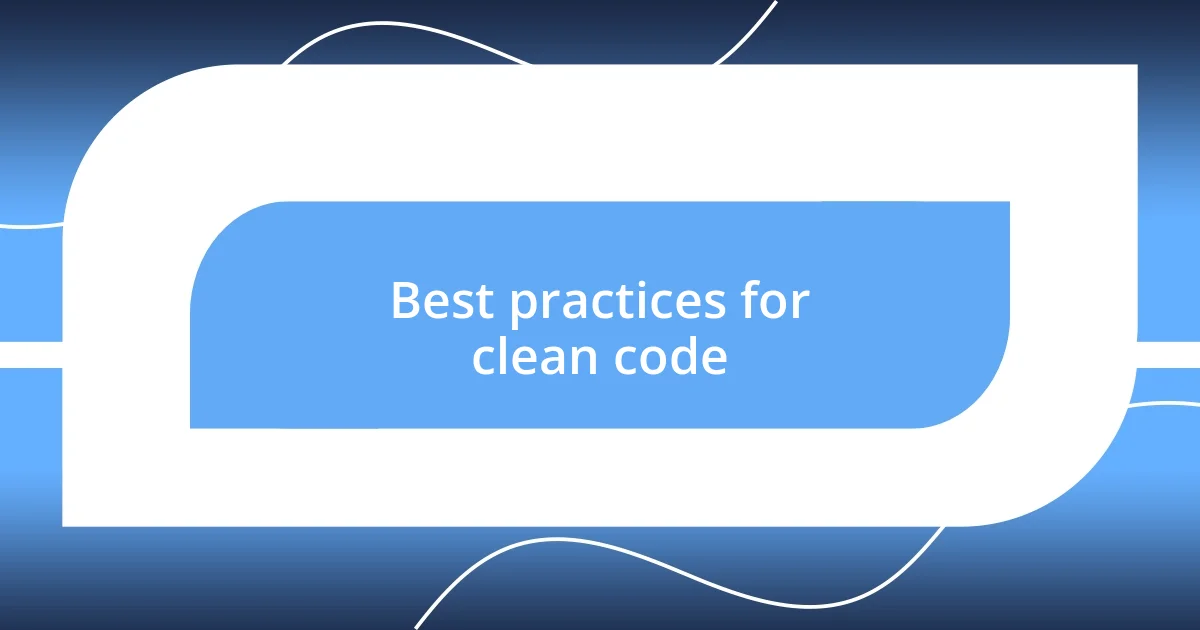
Best practices for clean code
When it comes to clean code, I believe one of the best practices is to consistently follow naming conventions. I used to name variables based on my mood or random thoughts, leading to confusion down the line. Have you ever scrolled through lines of code only to wonder, “What on earth is this variable supposed to represent?” By choosing meaningful and descriptive names, I found that not only do I save time later, but it also makes collaboration with others much smoother. It’s a simple change that elevates the quality of my work immensely.
Another effective strategy I’ve adopted is the practice of writing cohesive functions. There was a time when I packed every bit of logic into hefty functions, thinking I was being efficient. But as I sifted through that tangled code, I realized that splitting complex functions into smaller, focused ones made everything clearer. Each function should have a single purpose—do you remember the joy of knowing exactly what a function does with just a glance? This shift changed my workflow for the better, making my code more maintainable.
I can’t overlook the significance of thorough code reviews, either. Initially, I viewed them as just another step in the process, but now I see them as invaluable opportunities for learning and improvement. Engaging peers in a review can expose blind spots I might have missed while coding. I’ll never forget a time when a colleague’s feedback pushed me to rethink a solution entirely, leading to a cleaner, smarter approach. It’s about creating a culture of growth and collaboration—something that benefits everyone involved.
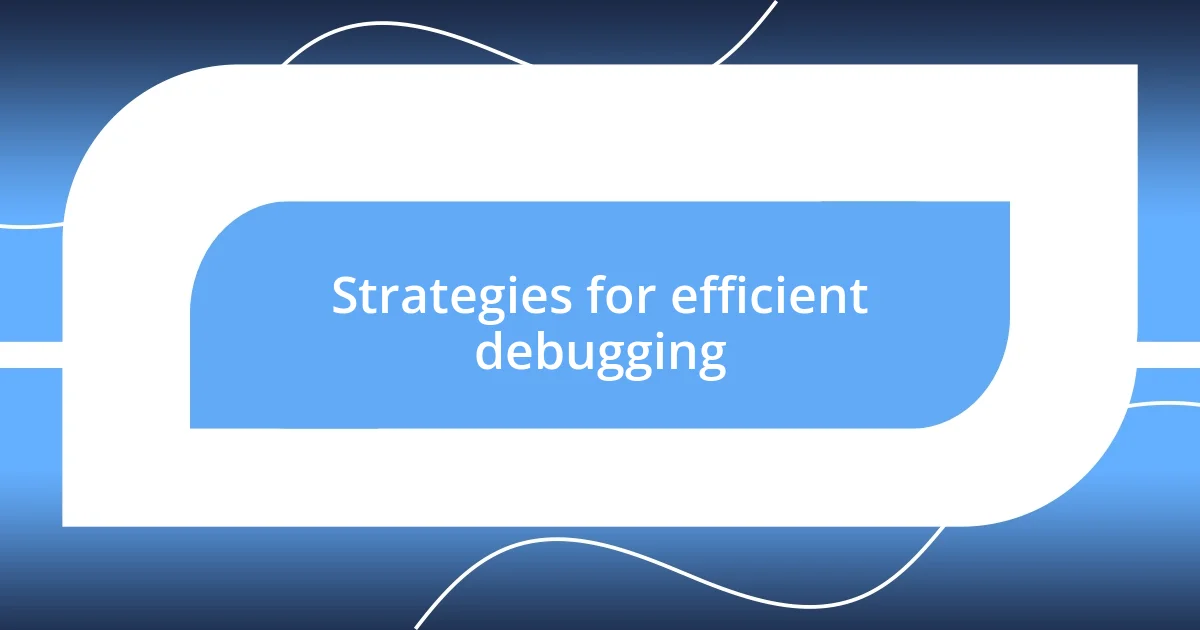
Strategies for efficient debugging
When it comes to efficient debugging, one strategy I’ve found invaluable is to utilize logging extensively. Early on, I approached debugging like a detective solving a mystery—interrogating each line. But once I started integrating log statements, it was like flipping on a light in a dark room. I’ve caught myself saying, “Why didn’t I do this sooner?” It not only clarifies the state of my application at various checkpoints but also allows me to revisit issues months later with ease.
Another impactful method is to reproduce bugs consistently. In the past, I would see a bug once and scramble to fix it without understanding its root cause. I remember a frustrating week spent chasing a recurring issue that eluded me until I finally took the time to replicate it reliably. This approach led me to discover underlying problems in my logic that I would’ve otherwise missed. Isn’t it remarkable how a little patience can unveil bigger insights?
Lastly, I find it beneficial to take breaks when facing stubborn bugs. I used to feel guilty stepping away, thinking I was wasting time. But I’ve learned that stepping back often leads to the “Aha!” moment—like when I returned to a project after a quick walk and immediately spotted an error that had previously stumped me for hours. Sometimes, our brains need space to breathe. Have you experienced that exhilarating clarity after a moment of distance? It’s one of those unexpected joys of debugging that reminds me to trust my instincts and let the mind wander.
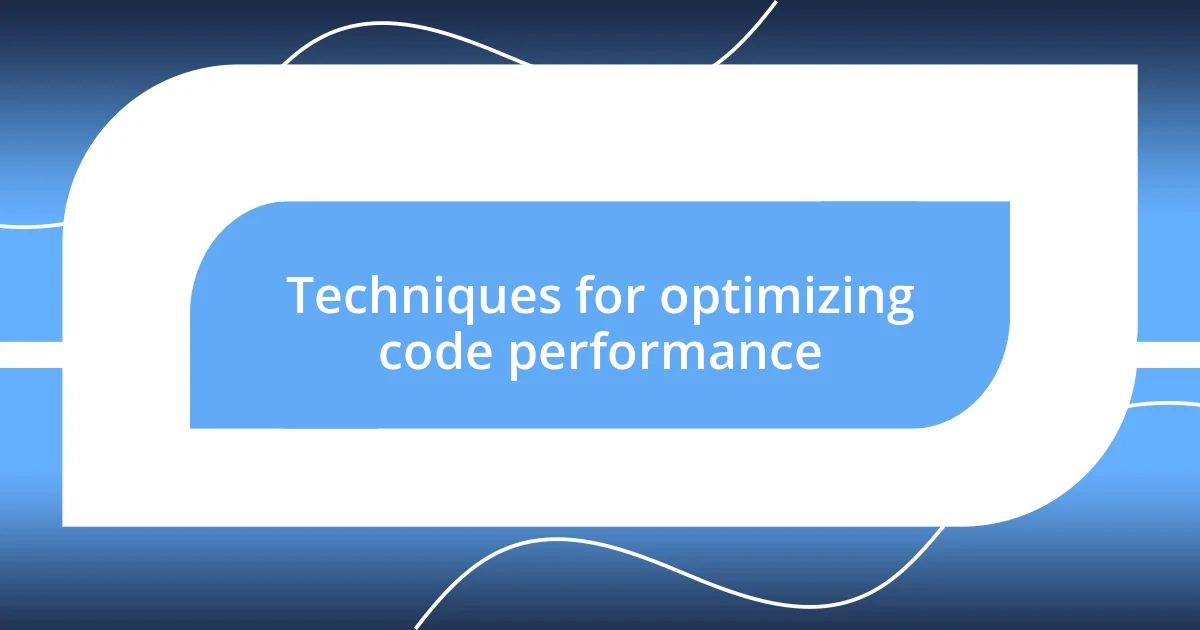
Techniques for optimizing code performance
One technique I swear by for optimizing code performance is minimizing unnecessary computations. In my early days, I often calculated values multiple times without thinking. One project, in particular, had a loop where a function was called repeatedly, and I noticed the performance lagging severely. When I finally stored the result instead of recalculating, it was like taking a breath of fresh air—suddenly, the application ran much smoother. Have you ever experienced the relief of simplifying a process you thought was working just fine?
Another powerful approach I’ve integrated is using data structures wisely. Early on, I was a fan of lists for everything, thinking they were easy to work with. However, I quickly learned that using sets and dictionaries can drastically speed up lookups and reduce the time complexity of my code. I remember a scenario where switching from a list to a dictionary cut down processing time from several seconds to mere milliseconds. Isn’t it fascinating how a simple shift in data structure can lead to such moments of efficiency?
Lastly, I always prioritize caching for frequently accessed data. There was a time during a project that relied heavily on fetching data from an external API. Every request felt sluggish, and I could almost hear my frustration echoing. Implementing a caching mechanism transformed the user experience—retrieving data became almost instantaneous. It felt like handing my users a fast pass; have you felt the satisfaction of improving performance dramatically with just a few lines of code? It’s those little victories that remind me of the importance of thoughtful optimization.
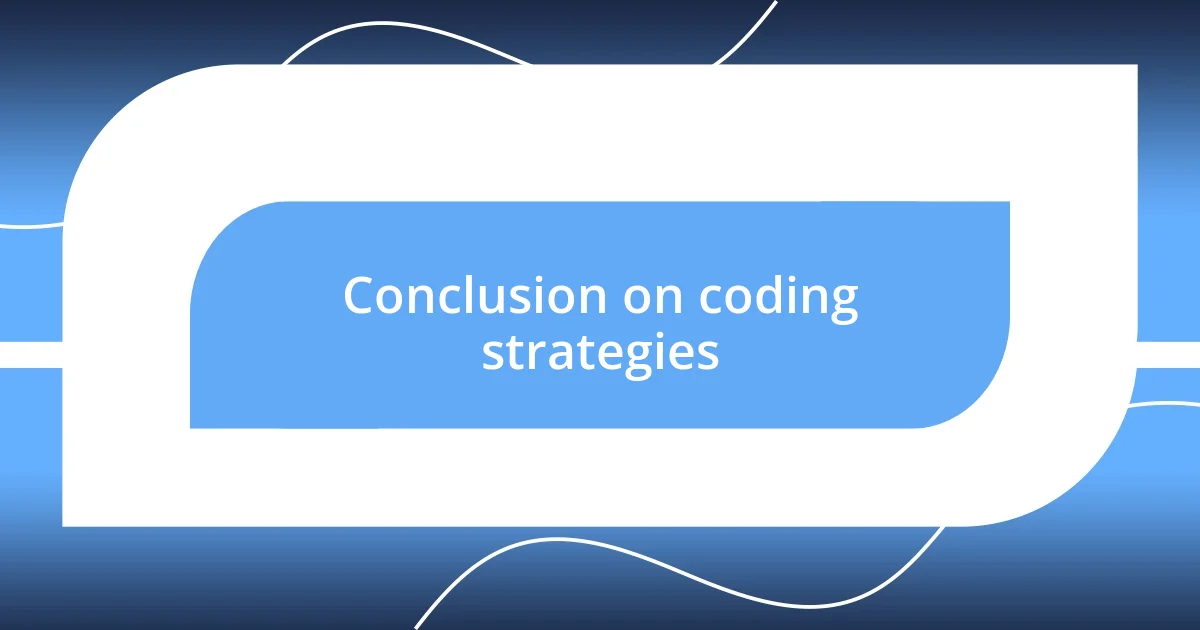
Conclusion on coding strategies
Reflecting on the best coding strategies reveals a tapestry of experiences that enrich our craft. I’ve come to appreciate that coding is not merely about writing lines of text; it’s about developing a mindset geared toward efficiency and clarity. Each strategy, whether it’s debugging or optimizing code performance, teaches us to approach challenges creatively. Have you ever considered how a shift in perspective might change your coding practice?
Moreover, I think it’s vital to cultivate a habit of continuous learning. As I’ve dived deeper into coding, I realized that sticking to what I know wouldn’t suffice. There were countless moments when I ventured into unfamiliar territory, and while it was intimidating at first, each challenge led to invaluable growth. Do you remember a time when stepping out of your comfort zone led to a breakthrough?
Ultimately, my journey in coding has taught me that collaboration can often yield remarkable insights. I’ve been part of discussions where sharing experiences sparked entirely new ideas that I hadn’t considered before. Engaging with others in code reviews or brainstorming sessions reminds me that we’re all learners in this vast field. Isn’t it exhilarating to think how many paths we can explore together?












